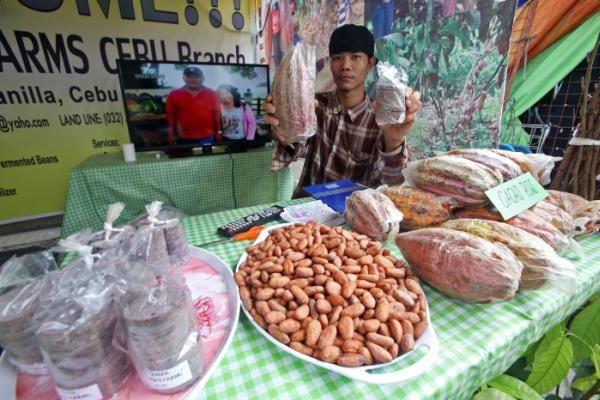‘Agri-preneur’ pushes cacao for sustainable farming

JR Lastimosa shows their cacao and tableya products of Rosit Cacao Farms, displayed in the ongoing Agri-Fishery Trade Fair at the Cebu Provincial Capitol for the 446th Founding Anniversary of Cebu Province. (CDN PHOTO/ JUNJIE MENDOZA)
A family man in Davao City left his government job to take up cacao farming.
Three years after, Grover Rosit, 55, has another advocacy—helping fellow farmers in Yolanda-hit areas become agriculture entreprenuers of cacao.
“Now is the time for farmers to pursue a good kind of farming. I think only cacao is sustainable for the next 20 years,” Rosit said.
Rosit was among the first to set up a booth at the Cebu provincial government’s agri-fisheries trade fair that opened last Monday at the Capitol grounds.
When Rosit decided to retire three years ago, after 25 years in government, he planted cacao trees on a four-hectare property inherited by his wife, a public school teacher, in Davao City to augment the family’s income.
The Rosit Cacao Farms has since expanded. They now have a piece of land in Minglanilla town with 20,000 cacao seedlings planted.
Rosit said he wants to help farmers affected by Supertyphoon Yolanda by encouraging them to plant cacao.
“Planting cacao is the easiest way for them to recover. They can start harvesting 18 months to two years after the seedlings are planted,” he said.
Rosit said he wants to help Cebu farmers use proper technology in planting cacao.
“They won’t fail. They will get a 98 to 100 percent success rate,” Rosit assured.
A cacao tree bears three to four kilos of dried beans per year.
A one-hectare farm can accommodate around 1,000 cacao trees.
The market value of cacao beans is about P150 per kilo.
Rosit said that each year, a farmer with a hectare of land can earn P450,000.
Initial capital is P50,000 to P80,000 per hectare.
“Let me say this to all farmers—do not belittle your being farmers. I can assure you that all your children can finish college if you plant cacao,” Rosit said.
He said all his six children finished college through his cacao farming.
Every last Sunday of the month, Rosit Cacao Farms holds trainings for farmers in their farm in Minglanilla, south Cebu.
Rosit said that farming requires continuous learning, patience and love.
“Farm by heart. Do not stop in your farming. Go on and level up,” he said.
Rosit said hopes to expand to Luzon in the next six months.
He also plans to venture into cacao processing.
“Maybe we can later see Rosit Chocoaltes in the malls, not just cacao products. We have already shared everything about cacao farming. We need to level up,” he said.
Disclaimer: The comments uploaded on this site do not necessarily represent or reflect the views of management and owner of Cebudailynews. We reserve the right to exclude comments that we deem to be inconsistent with our editorial standards.
